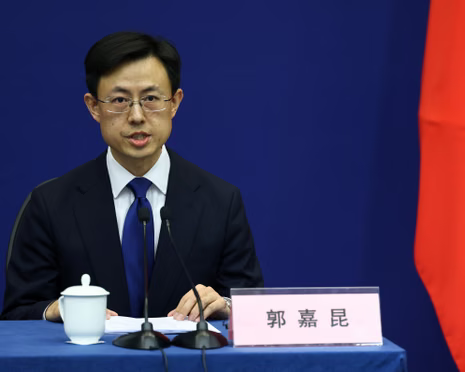
China Blocks U.S. Federal Employee From Leaving the Country, Raising Alarms Over Beijing’s Use of Exit Bans
The Chinese government has blocked a U.S. federal employee from leaving the country, marking a troubling escalation in Beijing’s use of exit bans—controversial measures increasingly used to exert diplomatic pressure and intimidate foreign nationals, including Americans.
According to the U.S. State Department, the individual works for the U.S. Patent and Trademark Office and was visiting China for personal reasons. Although not on official business, the federal employee’s detention has sparked diplomatic concern, as it reportedly represents the first time a U.S. government employee has been subjected to such a restriction.
A State Department spokesperson confirmed the case and emphasized, “We are tracking this case very closely and are engaged with Chinese officials to resolve the situation as quickly as possible.”
The Washington Post reported that the employee may have failed to disclose his government employment on the visa application and had previously served in the U.S. Army. Still, Chinese authorities have not clarified the legal basis for the exit ban.
Adding to the alarm, another American citizen, Chenyue Mao—a Wells Fargo employee and naturalized U.S. citizen of Chinese descent—has also been blocked from leaving China. Chinese foreign ministry spokesperson Guo Jiakun confirmed Mao’s exit ban, claiming she is involved in a “criminal case” and is cooperating with law enforcement. Wells Fargo has since prohibited all employees from traveling to China, a stark reflection of growing fears over Beijing’s unpredictable treatment of American citizens.
Exit Bans: China’s Diplomatic Weapon
While China claims exit bans are used in criminal investigations or civil disputes, rights groups say they are increasingly wielded as tools of coercion and diplomatic leverage. Safeguard Defenders, a watchdog group, reported in 2023 that under Xi Jinping’s rule, exit bans have expanded both in scope and frequency—often used without legal transparency or due process.
These bans can affect not only those directly involved in alleged legal matters, but also their family members and associates. In one notorious example, two American siblings—Cynthia and Victor Liu—were barred from leaving China for three years despite facing no criminal charges. Their father, a former Chinese bank official, was the actual target of the government’s pursuit.
Implications for U.S. National Security and Business
Beijing’s targeting of a U.S. federal employee—however technical the visa issue may appear—raises serious questions about the safety of American government personnel and civilians traveling to China. What was once a risk for activists, journalists, or Chinese dissidents has now extended to regular citizens and even employees of the U.S. government.
This weaponization of mobility restrictions has grave implications. First, it undermines the safety of U.S. nationals abroad, eroding confidence in travel to China for business, academic, or diplomatic purposes. Second, it reveals China’s willingness to use American citizens as bargaining chips, especially during periods of heightened geopolitical tension.
The economic impact is already visible. Wells Fargo’s immediate travel ban for employees could signal broader hesitation among U.S. corporations to allow staff travel to China. If American firms perceive that their personnel are vulnerable to politically motivated detentions, long-term investment and operational planning in China could be disrupted.
A Pattern of Hostage Diplomacy
This incident is not isolated—it is part of a broader pattern of China’s so-called “hostage diplomacy.” From the arbitrary detention of Canadian citizens Michael Kovrig and Michael Spavor to the exit bans placed on innocent Americans, Beijing continues to use human leverage as a blunt-force tool to silence criticism and extract concessions from foreign governments.
China’s tactic poses a direct challenge to the norms of international diplomacy and human rights. It also undermines the global rules-based order the U.S. and its allies have long worked to uphold.
What Americans Need to Know
This case should serve as a wake-up call to all Americans—business travelers, students, government employees, and tourists alike. Traveling to China now carries increasing risks, not only due to espionage laws and surveillance, but also because of arbitrary state actions like exit bans. Even those not involved in sensitive work could be detained over minor issues or exploited for political purposes.
U.S. policymakers must remain vigilant and proactive in protecting American citizens abroad. This includes issuing stronger travel advisories, engaging in swift diplomatic negotiations when cases arise, and coordinating with allies who also face these tactics.
As China expands its authoritarian toolkit beyond its borders, Americans must be aware: Beijing’s actions no longer stop at censorship or cyberattacks—they now include the freedom of movement itself.